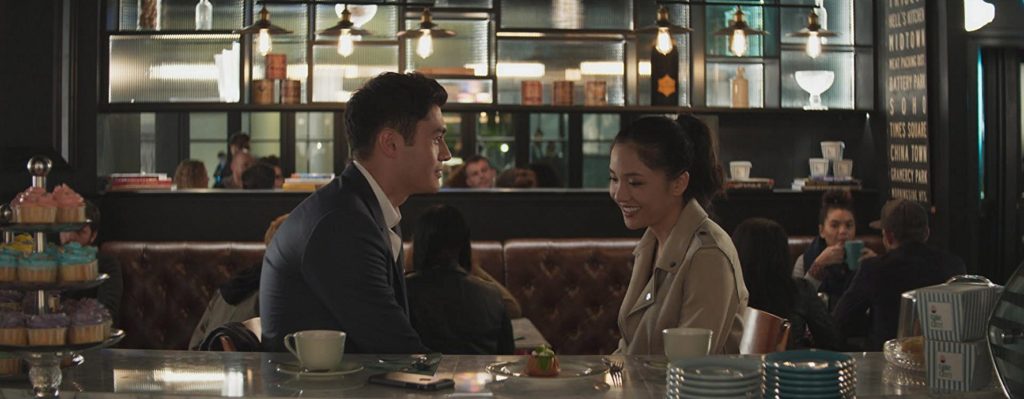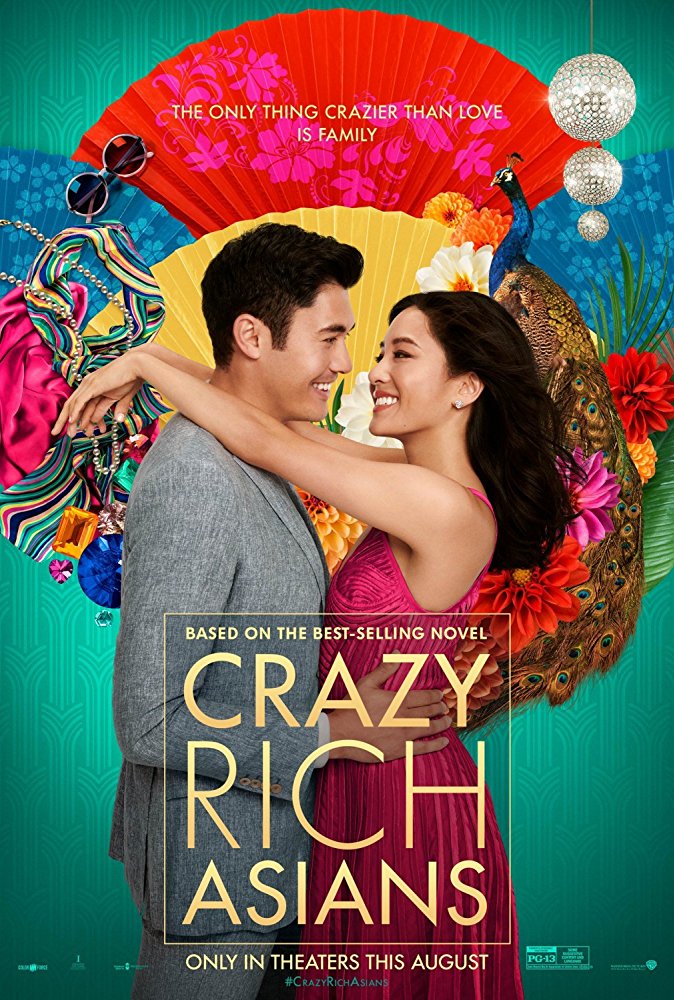I attended a special advance screening of Crazy Rich Asians, starring Constance Wu and Henry Golding. And let me be honest:
I wanted to support it, but I wasn’t sure it was going to be something I’d enjoy.
I’m picky about my romantic comedies. From the trailers, Crazy Rich Asians looks like a classic clash-of-the-families, clash-between-two-worlds rom-com. Girl gets shunned by Boy’s family, but the plucky Girl shows ’em she’s worthy. Conflict ensues but, in the end, there’s some sort of happy ending and everyone feels good. A familiar movie. The difference, though, is this one has a ton of Asians.
But, there’s two parts to every story. There’s the flesh and the soul. The flesh of Crazy Rich Asians is a rom-com featuring the aforementioned tropes. But, the soul is its writing, acting, and the normalization of Asians in roles normally reserved for pretty White actors.
I’m happy to say, I enjoyed it.

Henry Golding and Constance Wu in Crazy Rich Asians. Image from IMDB
Let’s get the movie mechanics out of the way first. Crazy Rich Asians is a charming movie because it’s well-written and funny. Every actor is exceptional in bringing out the best in their roles, heroes and villains alike. Even the smaller roles are great. I would argue that, in a lesser movie, the rom-com tropes would be a chore to sit through – the surprise at finding out the boyfriend is rich; the disapproval of the boyfriend’s mother; the take-no-$#!+ supportive best friend; the “makeover” of the girl (note the quotes. I promised no spoilers). But because the writing and acting are so good, most of these tropes are actually fun and charming to watch. They make the movie worth watching. And, thankfully, there are a few pleasant surprises.
Constance Wu plays Rachel Chu, the girl dating Nick Young, played by Henry Golding. Nick is the heir to his family’s business and fortune. He is a celebrity in Singapore (and other Chinese in the know) in the same way we have celebrities today: they’re rich and pretty. When Nick brings Rachel to Singapore to attend his best friend’s wedding, she is met by his disapproving Chinese mother, nosy family, and a collective of jealous women. Rachel, the New Yorker who we think can handle it, finds the experience belittling. With the support of a few friends – rapper and actress Awkwafina as Peik Lin, Gemma Chan as Nick’s cousin Astrid, and Nico Santos as Oliver – she sets out to win the respect of everyone. But when Nick’s mother and grandmother get in the way one last time, as rom-com villains do, Rachel isn’t sure she can handle a relationship with Nick anymore.
Constance Wu is cute, funny, and smart as the lead. Her character’s humor is grounded, the kind of wit we experience with our witty friends. She’s the one we root for because the odds are against her. Really against her. Literally. Except for Nick, Peik Lin, Astrid, Oliver, and a few other side characters, the entire super-large cast is against her.
Golding is the Asian Prince Charming. He’s loving, attentive, and loyal. He is the straight man, but he is likable and, as we learn more about his family and friends, we want to root for him, too. It’s difficult to say if Golding and Wu have chemistry, because, like their characters, they come from different worlds and it shows. But, in a way, this works to their advantage because this helps us buy them as such a couple.
Awkwafina and Santos are hilarious as Peik Lin, Rachel’s college friend, and Oliver, fashion guru and lackey for Nick’s mother, Eleanor. I cannot recall a scene featuring either character that wasn’t funny. And when they’re together, they make a great comedic duo. I wanted more scenes with them together.
Another notable performance is by Michelle Yeoh. As Nick’s mother, she oozes with disapprovement disguised as polite, conserved behavior. She epitomizes the Chinese mother who thinks – no, knows – she knows what’s best for her child. And her character is the perfect way to segue into talking about just how Asian this movie is.

Image from IMDB
As the movie began, I became worried. This movie is a first: it’s a Hollywood production featuring mostly Asians in what otherwise looks like a standard, romantic comedy. Yes, The Joy Luck Club preceded Crazy Rich Asians with it’s Chinese-centric cast, but it’s not quite the same. The focus of The Joy Luck Club was highlighting difference between the world of Chinese mothers and the new world of their Chinese daughters. It focused intently on Chinese and Chinese-American culture. Contrast that with Crazy Rich Asians, a rom-com with a Chinese/Singaporean-Chinese soul. As such, I worried that perhaps the barrage of Chinese references would alienate non-Asian audiences. But as the movie went on, that worry slipped away. In retrospect, I realize I fell victim to the way Asians aren’t normalized in mainstream media, even as the movie attempts to normalize Asians in a romantic story.
This, I think, is even more important than the mechanics of the movie that make it fun to watch. Crazy Rich Asians presents Chinese culture in Singapore and highlights its difference from Chinese-American culture without apology. This isn’t a case of drawing attention to all things Asians to announce to the world, “Hey! It’s Asian stuff! In a Hollywood film! Look! Look at us!” Instead, attention is drawn to the Asians and Chinese culture in the film simply because they’re there. It’s subtext to the movie. There’s no reason why a mainstream movie shouldn’t feature any of it. Plus, they’re integral parts of the story.
The trope of family-VS-the-girlfriend/boyfriend and culture clashes aren’t new. But when you give it an old-world Chinese context, and add in tons of rich Chinese aristocrats, the audience gets a unique perspective on something familiar. In fact, Crazy Rich Asians features a lot of stereotypes that some non-Asians may recognize but many Asians will definitely recognize. But the movie treats those stereotypes with respect, because, as I have argued elsewhere, stereotypes often come from truth.
People are afraid to perpetuate stereotypes, and we’re especially sensitive to it today. But I would argue that when someone says they don’t want to perpetuate a stereotype, what they’re really saying is they don’t want to perpetuate a bad stereotype or a neutral stereotype in a bad way. This may seem obvious, but it’s an important distinction. Like cultural appropriation: people say they don’t like it, but they’re actually okay with cultural appropriation except when it is done badly and without respect.
We see a lot of truths in Crazy Rich Asians, which should give audiences a glimpse into the stories behind many stereotypes we hold. We see an overbearing Chinese mother who thinks she can control, or at least greatly influence, her children. There’s an overly-critical matriarch with negative effect on her daughter-in-law. We see how, in Chinese culture, family must come first before personal ambition, even if it makes one unhappy. Many ethnic groups have a problem with being classist to those within their own race, and here we get to see the Chinese version of it. To be more specific, we get to see the wealthy Chinese version of it. The stereotype of rich, pretty, Asian “princesses” is clearly present. Gossip? Oh, I know that Chinese stereotype well. The nosy family? The nosy “aunties”? I grew up with that. These stereotypes may or may not be as well-known as, say, the Asian that’s good at math (oh, wait. Rachel is an economics professor), but they exist because they come from somewhere. These are things in Crazy Rich Asians many Chinese, many Asians, might identify with, whether they are American-born or not.
Then there’s the disparity and sense of classism that also exists between old world and American Asians. Many American-born Asians understand what it’s like to feel out of place or even excommunicated from old world Asians.
But wait, there’s more.
A bad stereotype of Asian males is that they’re thought of as less desirable than men of other races, especially White males. It’s also stereotypical to view Asian males as not very masculine, at least according to Western standards. These are examples of stereotypes with a debatable history; they’re not necessarily based on truth. So, when the confident, handsome Asian men in Crazy Rich Asians walk around on screen with their shirts off, displaying their toned, sexy bodies, that’s the movie’s way of trying to show off Asian men as sex symbols. Asian women don’t have that problem, often to their dismay. Asian women are stereotypically seen as exotic creatures. Add to that the stereotype of being demure and subservient, and the fetish gets worse. But, in Crazy Rich Asians, no main female character is sexualized (this doesn’t apply to some of the female extras, but in context, it works. Watch the movie. You’ll see). In fact, the most skin we see from the main female characters in this film, outside of some rather beautiful formal gowns, is when Rachel is laying around in a state of depression wearing a tank top and underwear. You know, normal at-home clothes. But the main male characters? Shirtless and unashamed. The movie is showing them off as sex symbols.
Like people of any ethnicity, there are all sorts of Asians. Crazy Rich Asians shows us sexy males, beautiful women, douchebag guys, subservient women, cowardly men, devious women, nerdy boys, cute girls, dumb dudes, intelligent women, standup men, and confident women. In other words, this movie features people. They just happen to be Asian.
Crazy Rich Asians gives us all this and applies it to the tried-and-true romantic comedy. The result? Everyday Asian culture in the kind of romance story Americans flock to see in theaters every year.
So, yes. The rom-com aspect of the movie is built on tropes. The writing and the acting make the story fun and worth watching. But its presentation of Asians in what is otherwise a normal romantic comedy is what makes Crazy Rich Asians important.
